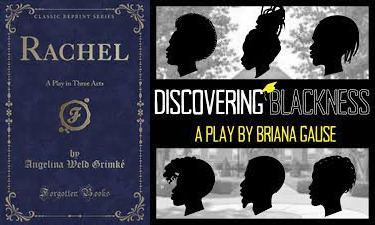Expanding your horizons: African-American Theater

June 2, 2021
Art, whether it be theater, film, or music, can allow us to observe and understand other people’s experiences. Theater, specifically, can serve as a bridge into a world of new cultures and ideas in which an audience is able to relate and empathize with characters who come from all different walks of life. Because of this power of theater, I believe that it is important to read and see plays with themes and plots that differ greatly from one’s life, as these plays allow us to more deeply understand the world around us. Thus, here are two plays from African-American writers that will hopefully showcase the power theater has in relating to people with different experiences:
Rachel by Angelina Weld Grimké
“Yes, that’s true, all right. God seems to have forgotten us.”
Rachel, written in 1916 by African-American writer Angelina Weld Grimké, revolves around a young woman named Rachel and her transformation from a jolly, naive child, to an adult struck down by the racism of the time. The evolution of Rachel’s character showcases the effect that early 20th-century racism had on Black Americans. The play, according to the program during its first production, was partially written to educate white audiences on the horrors of racism.
The play is quite effective in its purpose. When Rachel’s character completely breaks down by the end of the play, it is clear that the racism that she has encountered throughout her life has broken her. The play deals with hard topics such as lynching, racism in schools, segregation, and unemployment for Black Americans at the time. However, it is a very educational piece of theater that provides audiences with a snippet of the hardship that 20th century African Americans had to live through.
“Discovering Blackness” by Briana Gause
“It’s important to claim what’s yours. If it was important to try and erase us, and hate us, then it’s important to embrace us, and understand us.”
“Discovering Blackness” tells the story of nine Black college students determining what being Black means to them. Taking place in a PWI (Predominantly White Institution) during the year 2032, the play follows a student named Destiny in her journey of making a short film about Blackness after the university she is enrolled in banned many student cultural activities. Throughout the play, the characters reveal their distinct struggles with being Black in a PWI, while showing how being Black is something that has shaped them throughout their life.
The play portrays topics such as internalized racism, intersectionality, and the pressure of not living up to expectations in a very personal manner, which I loved. What stands out from this play, however, was how different and distinct all of the characters were from each other. There is a social media star, the President of the Black Student Union, a theater student, a guy who loves playing video games. This represents the theme of the show: that being Black is not a uniform experience and differs for everyone.
I reached out to the author, Briana Gause, and asked her about Black representation in theater and if she thought that “Discovering Blackness” defied some of the common tropes present in shows revolving around Black characters. She replied, “The diversity in representation is starting to emerge and that’s what I wanted for Discovering Blackness, and I think that’s what it does. We get to know 9 black students all with totally different walks of life. All of them are black, all of their existences are valid, and all their experiences are unique to them. Blackness isn’t one-dimensional and neither are my characters. That’s what I like to see in black art. Diversity in blackness. I love the idea of expanding the black imagination not only for black folks, but non black folks so we can all see how vast blackness truly is.”

